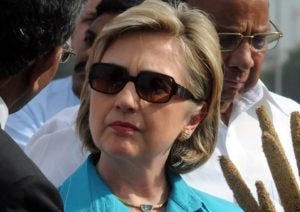Last month, things were looking downright frightening for the Trump campaign. On the heels of the party conventions (and Trump's belittling of a Gold Star family), Hillary Clinton was dominating the Republican presidential nominee, not only in the national polls (an 8-point lead in the Real Clear Politics average), but also in key swing states.
The election was shaping up to be the landslide defeat many disaffected Republicans and conservatives (including myself) had long predicted. After all, poll after poll throughout the primary season had revealed that Trump was deeply unpopular, and would have the hardest time of just about any of the Republican candidates beating Clinton in the general election. And this was after Clinton had already spent months demonstrating how utterly weak, untrustworthy, and unlikable of a candidate she was.
Yet, a plurality of Republican voters disregarded the electablity factor, and chose Trump to be their nominee.
For those of us on The Right who have deemed the premise of a Trump presidency to be no less destructive than that of a Hillary presidency (aka the #NeverTrump crowd), the primary concern became whether or not the GOP could hold onto the Senate and the House. It was a legitimate worry; last month, the polls indeed suggested that Trump was a drag on many down-ballot Republican candidates.
But then, something happened... Hillary Clinton began proving herself to be a far less appealing candidate than even her harshest critics could have imagined.
Just when it seemed that Clinton had successfully navigated past an email-server controversy and an FBI investigation that should have sunk her, mote details of the scandal emerged: tens of thousands of subpoenaed emails deleted, BleachBit used on the disk, smartphones destroyed with hammers, and Colin Powell tossed under the bus as a scapegoat.
After weeks of holding Trump's feet to the fire for his divisive language, Clinton decided to publicly refer to "half" of his supporters as a "basket of deplorables." In condescending, elitist fashion, she branded them as racist, sexist, homophobic, xenophobic, and Islamaphobic.
Next, her fainting spell at the 9/11 memorial in New York lent credence to the Trump campaign's narrative that she has health problems. Perhaps more importantly, her reflexive dishonesty about the incident drew attention, again, to her untrustworthiness.
All it took was a more tempered (and teleprompter-ed) Trump, over a few weeks, for Clinton to begin losing her edge in the polls. She now has just a one-point lead nationally in the RCP average, with Trump suddenly topping her in a number of key swing-states.
Clinton's campaign free-fall has hurt the rest of her party as well. Now the good money is on the GOP retaining both the House and Senate, with several Republican candidates managing to shake the Trump stigma, and take significant leads over their Democratic opponents.
Of course, we're still a number of weeks away from election night, and anything can happen. Clinton remains the odds on favorite (with a big electoral edge), and all it could take are a couple of fresh, asinine remarks from Trump to put the presidential race back to where it was last month.
What this shift in the polls does tell us, however, is that a lot of swing voters now find Clinton so unbelievably unappealing that they're willing to entertain the notion of lending their support to someone as widely detested as Donald Trump.
That's quite remarkable, and it makes you wonder what kind of landslide defeat Clinton would be queued up for right now, if the GOP had nominated practically anyone else.



